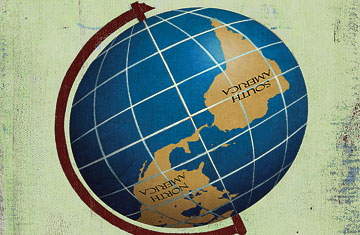
Stocks around the world have been tumbling in reaction to the dramatic news on Wall Street. In doing so, financial markets are trashing one of the fashionable economic theories of the past couple of years: that the rest of the world can "decouple" itself from the U.S. and keep on growing strongly. But that may not be the whole story. Just ask Stephen Lussier, an executive director at De Beers, the huge diamond group.
His London office is in the same hulking concrete building as the firm's diamond-sorting operation, so getting in to see him requires navigating through a maze of locked doors and red security zones worthy of Fort Knox. But it's worth the effort if you want to glimpse how globalization is upending a lot of conventional wisdom these days. If history were a guide, Lussier should be a worried man. The U.S. is easily the biggest market for diamond jewelry in the world, accounting for about 50% of the total, and whenever the American economy has hit a rough patch in the past, the diamond industry has quickly felt it. But not this time — or, at least, not yet. U.S. diamond sales have been dropping, but worldwide demand for rough diamonds has been stronger than ever, especially for the largest and most expensive rocks, and that has enabled De Beers to continue raising prices this year. "Normally we would be in a state of battening down the hatches, but so far that's not happening," Lussier says. "This is different from every economic cycle we have seen for the past 25 years."
The state of the diamond market is just one glittering example of a world that, to all appearances, has gone topsy-turvy. It is a world in which the biggest and most sophisticated financial markets, in the U.S. and U.K., are struggling to confront the sort of meltdown more normally associated with underdeveloped economies and feeble banking systems. (The only difference is that, in this case, the International Monetary Fund [IMF] isn't coming to the rescue with loans and tough policy prescriptions.) It is a world in which consumers for years benefited from bargain prices for everything from T shirts to flat-screen televisions thanks to ultra-low-cost producers in Asia — but now suddenly discover that skyrocketing consumption in those same Asian countries is pushing up the prices of staples such as wheat and milk. It is an increasingly interdependent world in which two countries with McDonald's restaurants were never again supposed to go to war — but one in which old-style geopolitics, in the form of Russian muscle-flexing, has suddenly intruded. (Both Georgians and Russians, it turns out, enjoy Big Macs with fries, even as they slug it out on the battlefield).
As he looks around the globe and tries to assess what to make of it all, Jagdish Bhagwati, a senior fellow for international economics at the Council on Foreign Relations in New York City, can't resist quoting the British economist John Maynard Keynes: "The inevitable never happens. It is the unexpected always."
Two Cheers for Free Trade
In such unpredictable times, the big questions are the extent to which the financial and economic woes in the U.S. will continue to spill over into the world economy — and whether this poses a threat to the onward march of globalization itself, as people lose faith in free markets and open trade.
The damage is already considerable: the IMF expects world economic growth to drop to 4.1% this year, its lowest since 2003, after a run of years at around 5%. Much of Europe and Japan seem particularly vulnerable, with Britain and Spain already teetering on the edge of recession. China and India, the huge growth engines of the past few years, also are facing slowdowns. It's still unclear just how far the contagion could spread. Certainly the demise of Wall Street titans Merrill Lynch and Lehman Bros., and the U.S. government bailouts of insurance giant AIG as well as mortgage lenders Fannie Mae and Freddie Mac, sent shock waves around the world.